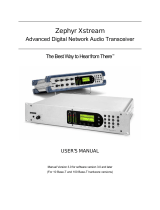Page is loading ...

XBee-PRO
®
XSC (S3B) Development Kit
Getting Started Guide
90002152_A
1/11/2012

©2012DigiInternational,Inc. 2
©2012DigiInternationalInc.
Allrightsreserved.
Digi,DigiInternational,theDigilogo,theDigiwebsite,aDigiInternationalCompany,XBee,andDigiXBeeare
trademarksorregisteredtrademarksofDigiInternational,Inc.intheUnitedStatesandothercountries
worldwide.Allothertrademarksarethepropertyoftheirrespectiveowners.
Allothertr ademarksmentionedinthisdocumentarethepropertyoftheirrespectiveowners.
Informationinthisdocumentissubjecttochangewithoutnoticeanddoesnotrepresentacommitmentonthe
partofDigiInternational.
Digiprovidesthisdocument“asis,”withoutwarrantyofanykind,eitherexpressedorimplied,including,butnot
limitedto,theimpliedwarrantiesoffitnessormerchantabilityforaparticularpurpose.Digimaymake
improvementsand/orchangesinthismanualorintheproduct(s)and/ortheprogram(s)describedinthismanual
atanytime.
Thisdocumentcouldincludetechnicalinaccuraciesortypographicalerrors.Changesareperiodicallymadetothe
informationherein;thesechangesmaybeincorporatedinneweditionsofthepublication.

©2012DigiInternational,Inc.. 3
Table of Contents
Introduction.................................................................................................................... 4
Goals of the Kit ....................................................................................................... 4
Requirements of the Kit.......................................................................................... 4
System Requirements ..........................................................................................4
Additional Documentation .....................................................................................4
Using this Guide............................................................................................................ 5
Conventions used in this Guide.............................................................................. 5
Contact Information................................................................................................. 5
Part 1: Set up your XBee-PRO XSC (S3B) Development Kit ............................. 6
Identify Kit Components.......................................................................................... 6
Assemble your Development Kit ............................................................................ 6
Part 2: Download and Install Software.................................................................... 7
Installing USB Drivers............................................................................................. 7
Installing X-CTU Software ...................................................................................... 7
Part 3: Test Communications Link.......................................................................... 8
Perform a Range Test ............................................................................................ 8
Part 4: Change Firmware Versions......................................................................... 11
Appendix A: Troubleshooting.................................................................................13
Resetting the XBee-PRO XSC Module................................................................ 13
Resolving Radio Communication Issues.............................................................. 13
Resolving Radio Responses in X-CTU ................................................................ 13

©2012DigiInternational,Inc.. 4
Introduction
ThankyouforpurchasinganXBee‐PRO
®
XSC(S3B)DevelopmentKit.Thiskitisdesignedtomakeiteasy
tosenddatafromoneXBee
®
toanother,andtestthetransmissiondistanceoftheradios.Beforeyou
startworkingwiththekit,let'scoversomebasics.
Goals of the Kit
Asyougothroughthestepsinthiskit,youwill:
Requirements of the Kit
System Requirements
Toinstallthesoftwarementionedinthisguide,youwillneedaPCrunningMicrosoftWindows
2000,XP,VistaorWindows7.
Additional Documentation
FormoreinformationonconfiguringandusingtheX‐CTUutility,pleaserefertotheuserguide:X‐CTU
Configuration&TestUti litySoftwareUsersGuide.
1.SetupyourXBee‐PROXSC(S3B)DevelopmentKit
2.Downloadandinstall X‐CTUconfigurationsoftware
3.Performarangetest
4.ChangeFirmwareVersions
Formoreinformationaboutthesoftware,APIoperations,ATcommandmodes,orthe
formfactorofthemodule,pleaserefertotheproductmanual:XBee/XBee‐PROXSCRF
ModuleProductManual.

©2012DigiInternational,Inc.. 5
Using this Guide
Conventions used in this Guide
Contact Information
FormoreinformationaboutyourDigiproducts,orforcustomerserviceandtechnicalsupport,contact
DigiInternational.
Thisiconindicatesahint,orconceptthatislearned.
Thisiconindicatesthatagoalofthekithasbeencompleted.
Thisiconindicatesawarningofthepotentialforconfusionordanger.
ToContactDigiInternational: Use
Mail
DigiInternational
WorldHeadquarters
11001BrenRoadEast
Minnetonka,MN55343
Phone
8:00AM‐5:00PM(U.S.MountainTime)
1‐866‐765‐9885toll‐freeUSAandCanada
1‐801‐765‐9885Worldwide
OnlineSupport
http://www.digi.com/support/eservice/
login.jsp
Email rf‐e[email protected]

©2012DigiInternational,Inc.. 6
Part 1: Set up your XBee-PRO XSC (S3B)
Development Kit
Identify Kit Components
Carefullyunpackandverifythecontentsofyourkit.Yourkitshouldincludethefollowing:
Assemble your Development Kit
Toassembleyourdevelopmentkit,performthefollowingsteps:
1.InstallthemodulesontheXBeeInterfaceBoards(XBIB)byliningthepinsupwiththe
headersandpressingthemoduleintoplace.
2.AttachthedipoleantennatotheRPSMAmodule.
3.ConnectthefirstXBIBtoyourcomputerusingaUSBcable.Thisfirstdevicewillbeyour
baseradio.
4.ConnecttheremainingXBIBbyeitherusingthepowersupplyorUSBcable.
YouarenowreadytoruntheX‐CTUsoftwareandtobeginconfiguringyourXBeeNetwork.
YouhavejustcompletedGoal#1‐settingupyour
XBee‐PROXSC(S3B)DevelopmentKit.
XBee Interface Boards (2)
Antenna
USB Cable (2)
XBee Module (2)
Power Supply

©2012DigiInternational,Inc.. 7
Part 2: Download and Install Software
Installing USB Drivers
TheXBeeUSBInterfaceBoardisa“plug‐and‐play”devicethatshouldbedetectedbythePC
automatically.IfyouareusingWindows7orVista,theUSBdriversshouldinstallandanotificationwill
appearinthelowerrightportionofyourscreenindicatingsuccessorfailure.IftheUSBdriversfailto
install,pleasefollowtheUSBdriverinstallationinstructionsfoundhere:
http://www.digi.com/support/kbase/kbaseresultdetl.jsp?id=3214.
IfyouareusingWindows2000orXP,downloadandinstallthedriverasperthefollowingdirections.
ToinstalltheUSBdriver:
1.Downloadthedriversetupfileat:
http://ftp1.digi.com/support/driver/FTDI_Windows_Driver_Setup.exe.
2.Double‐clickonthesetupfile.Awindowwillpopupduringinstallationandautomaticallyclose
whentheprocessiscomplete.
Installing X-CTU Software
1.DownloadX‐CTUatwww.digi.com/xctu.
2.Browsetothefoldertowhichyousavedtheaboveinstallfile.
3.Double‐clickontheinstallerfileandfollowtheX‐CTUSetupWizard.
4.WhenaskedifyouwouldliketocheckDigi'sweb siteforfirmwareupdates,clickYes.
5.Afterthefirmwareupdatesarecomplete,clickClose.Updatesmaytakeafewminutes,pleasebe
patient.
6.StartX‐CTUbydouble‐clickingontheX‐CTUicononyourdesktop,orbyselectingStart>Programs
>Digi>X‐CTU.
YouhavejustcompletedGoal#2‐downloadandinstall
software.

©2012DigiInternational,Inc.. 8
Part 3: Test Communications Link
Perform a Range Test
Toruntherangetest,performthefollowingsteps:
1.Double‐clicktheX‐CTUshortcutonyourdesktop.
2.UnderthePCSettingstab,selecttheserialCOMportassociatedwiththedevelopmentboardsyou
havejustattachedtoyourcomputer.
3.Verifythatthebaudrateanddatasettingsmatchtheinternalsettingsofthedevices:
• Baud Rate: 9600
• Flow Control: NONE
• Data Bits: 8
• Parity: NONE
• Stop Bits: 1
Note: The baud rate needs to match the BD parameter in the radios for X-CTU

©2012DigiInternational,Inc.. 9
to communicate correctly with the radios. The default is 9600.
You will need to have a jumper at P8 on the loopback header on the XBIB for
the remote radio.
4.SelecttheRangeTesttab.
5.(Optional)Checkthe“RSSI”checkboxtoenableReceivedSignalStrengthIndicator.
6.ClickStarttobegintherangetest
TherangetestworksbestifyouattachthefirstXBIBtoyourcomputerandattachthe
seconddevicetoalaptop.Increasethedistancebetweenthefirst(base)radioandthe
second(remote)radiowhilemonitoringthepercentageofgoodpacketsonthelaptop.

©2012DigiInternational,Inc.. 10
7.MonitorthelinkqualitybyreadingthePercentsectionontheRangeTesttab.Thissectiondisplays
therunningpercentageofgoodpack etssenttothereceivingradioandloopedbacktothebase.
8.ClickStoptoendtherangetest
YouhavejustcompletedGoal#3‐performingarangetest

©2012DigiInternational,Inc.. 11
Part 4: Change Firmware Versions
ThesemodulescanbeconfiguredforanRFdatarateof9600or19200baudwithjustafirmwarechange.
WhenintegratingtheseradioswiththeXStreamoroldXBee‐PROXSCproductlines,theRFdatarates
mustmatch.ForXStreamradiosstartingwiththepartnumberX09‐009or
oldXBee‐PROXSCradios,use
the9600baudversion.ForXStreamradiosstartingwiththepartnumberX09‐019,usethe19200baud
version.
1.ClickontheModemConfigurationtabinX‐CTU.
2.Selectthemodemtype(XBP9B‐XC)fromtheModemdrop‐downbox.
3.SelectthefunctionsetthatcorrespondswiththeRFdataratedesired,XBee‐PROXSC‐S3B9600or
XBEE‐PROXSC‐S3B19200.
4.SelectthefirmwareversiondesiredfromtheVersiondrop‐downbox.Thedefaultselectedisthe
newestversionofthefirmware.
5.Checkthealwaysupdatefirmwarebox.
6.ClicktheWritebutton.
Thissequenceisalsousefulforswitchingbetweentheregularfirmwareandthe920
MHzfirmware.

©2012DigiInternational,Inc.. 12
XBee‐ PRO XSC (S3B) Development Kit Getting Started Guide
Ifyoudonotseethefirmwareversionyouarelookingforinthe
Versiondrop‐downbox,youcanquerythefirmwaredatabasefor
updates.Todoso,clickontheDownloadnewversions...buttonand
clickWeb.AnyfirmwareversionsnotinX‐CTU'slibrarywillbe
downloaded.
YouhavejustcompletedGoal#4‐ChangeFirmwareVersions

©2012DigiInternational,Inc.. 13
Appendix A: Troubleshooting
Resetting the XBee-PRO XSC Module
EachXBeeUSBInterfaceBoardhasaresetbutton(locatedasshownbelow):
Pressingthisbuttonresetsthemodule,butwillnotclearanychangeswrittentothemodule.Pressingthis
buttonwillalsoresettheCOMportfortheboard.
Resolving Radio Communication Issues
OthernetworksettingsthatcancauselossofcommunicationincludeHoppingChannel(HP),BaudRate
(BD),andParity(NB)amongothers.Checktoseeiftheseparametersaresetappropriately.Ifyouare
unsureifyoursettingsareaffectingyourcommunication,youmightwanttotrysettingyourmodules
backto
theirdefaultsettings.Todoso,gototheModemConfigurationtabinX‐CTUandclickRestore.
Resolving Radio Responses in X-CTU
Checktomakesur etheloopbackjumperisnotbridgingtheP8headerontheinterfaceboard.
/
